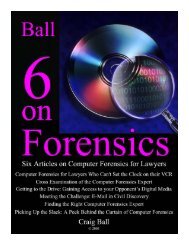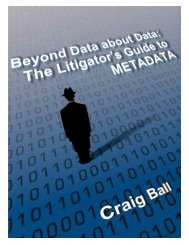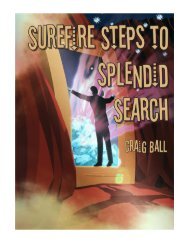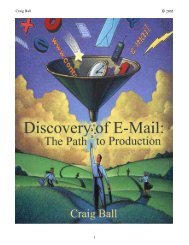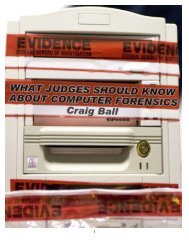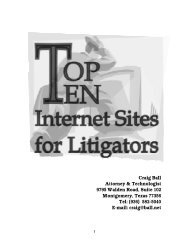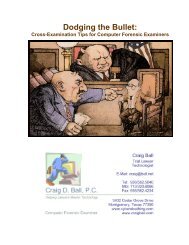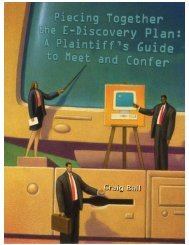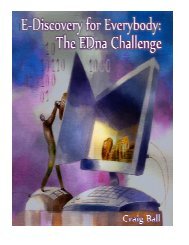Five on Forensics Page 1 - Craig Ball
Five on Forensics Page 1 - Craig Ball
Five on Forensics Page 1 - Craig Ball
Create successful ePaper yourself
Turn your PDF publications into a flip-book with our unique Google optimized e-Paper software.
<str<strong>on</strong>g>Five</str<strong>on</strong>g> <strong>on</strong> <strong>Forensics</strong><br />
© 2002-2008 <strong>Craig</strong> <strong>Ball</strong> All Rights Reserved<br />
like <strong>on</strong>e’s office than a file drawer. It may hold data about the full range of a user’s daily<br />
activity, including private or c<strong>on</strong>fidential informati<strong>on</strong> about others. Trade secrets, customer<br />
data, e-mail flirtati<strong>on</strong>s, salary schedules, Internet searches for escort services, bank account<br />
numbers, medical records and passwords abound.<br />
So how does a court afford access to the n<strong>on</strong>-privileged evidence without inviting abuse or<br />
exploitati<strong>on</strong> of the rest? With so much at stake, courts need to approach forensic<br />
examinati<strong>on</strong> cautiously. Granting access should hinge <strong>on</strong> dem<strong>on</strong>strated need and a showing<br />
of relevance, balanced against burden, cost or harm. It warrants proof that the opp<strong>on</strong>ent is<br />
either untrustworthy or incapable of preserving and producing resp<strong>on</strong>sive informati<strong>on</strong>, or that<br />
the party seeking access has some proprietary right with respect to the drive or its c<strong>on</strong>tents.<br />
Showing that a party lost or destroyed ESI is a comm<strong>on</strong> basis for access, as are situati<strong>on</strong>s<br />
like sexual harassment or data theft where the computer was instrumental to the alleged<br />
misc<strong>on</strong>duct.<br />
The parties may agree that <strong>on</strong>e side’s computer forensics expert will operate under an<br />
agreed protocol to protect unwarranted disclosure of privileged and c<strong>on</strong>fidential informati<strong>on</strong>.<br />
Increasingly, courts appoint neutral forensic examiners to serve as Rule 53 Special Masters<br />
for the purpose of performing the forensic examinati<strong>on</strong> in camera. To address privilege<br />
c<strong>on</strong>cerns, the informati<strong>on</strong> developed by the neutral is first tendered to counsel for the party<br />
proffering the machines for examinati<strong>on</strong>, which party generates a privilege log and produces<br />
n<strong>on</strong>-privileged, resp<strong>on</strong>sive data. Use of a Special Master largely eliminates the risk of<br />
privilege waiver in unrelated litigati<strong>on</strong>, a potential addressed in Hops<strong>on</strong> v. Mayor of Baltimore,<br />
232 F.R.D. 228 (D. Md. 2005)<br />
Whether an expert or court-appointed neutral c<strong>on</strong>ducts the examinati<strong>on</strong>, the order granting<br />
forensic examinati<strong>on</strong> of ESI should provide for handling of c<strong>on</strong>fidential and privileged data<br />
and narrow the scope of examinati<strong>on</strong> by targeting specific objectives. The examiner needs<br />
clear directi<strong>on</strong> in terms of relevant keywords and documents, as well as pertinent events,<br />
topics, pers<strong>on</strong>s and time intervals. A comm<strong>on</strong> mistake is for parties to agree up<strong>on</strong> a search<br />
protocol or secure an agreed order without c<strong>on</strong>sulting an expert to determine feasibility,<br />
complexity or cost. Generally, use of a qualified neutral examiner is more cost-effective and<br />
ensures that the court-ordered search protocol is respected.<br />
Who Performs Computer <strong>Forensics</strong>?<br />
Computer forensics is a young discipline, so the most experienced examiners may be largely<br />
self-taught. Experienced examiners still tend to emerge primarily from law enforcement, but<br />
this is changing as a host of computer forensics certificati<strong>on</strong> courses and even college<br />
degree plans have appeared. Unfortunately, though the ranks of those offering computer<br />
forensics services are growing rapidly, there is inadequate assessment or regulati<strong>on</strong> of the<br />
professi<strong>on</strong>. No universally recognized standard exists to test the training, experience and<br />
integrity of forensic examiners. A few states require computer forensic examiners to obtain<br />
private investigati<strong>on</strong> licenses, but d<strong>on</strong>’t demand that applicants possess or dem<strong>on</strong>strate<br />
expertise in computer forensics.<br />
<strong>Page</strong> 91



